现代大学英语口语3 Unit6 ppt
- 格式:ppt
- 大小:2.36 MB
- 文档页数:7
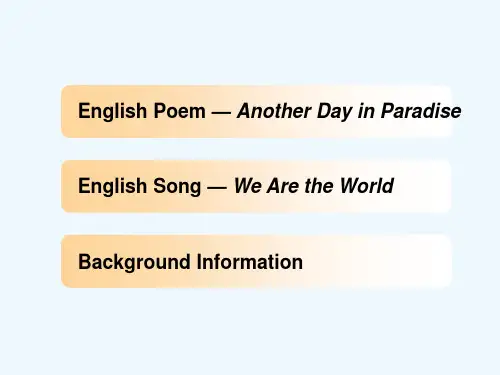
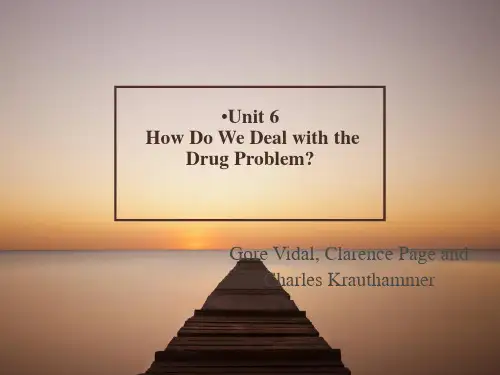
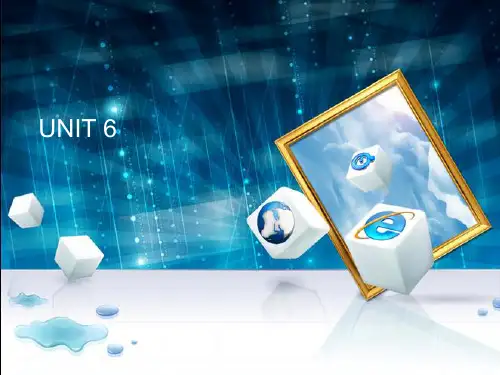
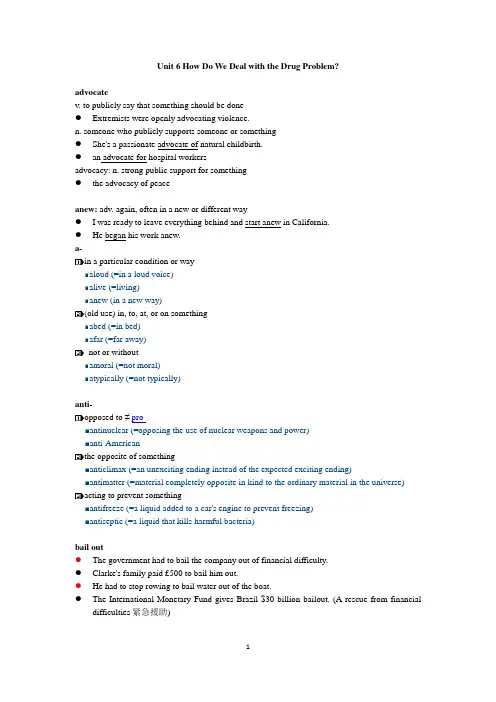
Unit 6 How Do We Deal with the Drug Problem?advocatev. to publicly say that something should be done●Extremists were openly advocating violence.n. someone who publicly supports someone or something●She's a passionate advocate of natural childbirth.●an advocate for hospital workersadvocacy: n. strong public support for something●the advocacy of peaceanew: adv. again, often in a new or different way●I was ready to leave everything behind and start anew in California.●He began his work anew.a-in a particular condition or wayaloud (=in a loud voice)alive (=living)anew (in a new way)(old use) in, to, at, or on somethingabed (=in bed)afar (=far away)not or withoutamoral (=not moral)atypically (=not typically)anti-opposed to ≠ pro-antinuclear (=opposing the use of nuclear weapons and power)anti-Americanthe opposite of somethinganticlimax (=an unexciting ending instead of the expected exciting ending)antimatter (=material completely opposite in kind to the ordinary material in the universe) acting to prevent somethingantifreeze (=a liquid added to a car's engine to prevent freezing)antiseptic (=a liquid that kills harmful bacteria)bail out●The government had to bail the company out of financial difficulty.●Clarke's family paid £500 to bail him out.●He had to stop rowing to bail water out of the boat.●The International Monetary Fund gives Brazil $30 billion bailout. (A rescue from financialdifficulties紧急援助)-ery (-ry)the group or class of: machinery (=different types of machines) ◆gadgetry the state or character of: bravery (=the quality of being brave) ◆slavery (=the condition of being a slave)◆rivalrythe art or practice of: cookery ◆archerya place where sth is made, grows, lives, etc: bakery ◆oil refineryconfiscate: to officially take private property away from someone, usually as a punishment●Their land was confiscated after the war.●Miss Williams confiscated all our sweets.confiscation n.criminalize: to make something illegal, or to treat sb as a criminal●The use of opium was not criminalized until fairly recently.●Many gay people felt that they were being criminalized for having relationships.-izeto become, make or make like: privatize ◆fossilize ◆Americanize ◆decriminalize ◆legalize ◆industrializeto place in: hospitalizede-shows an oppositedeindustrialization (=becoming less industrial)shows that something is removedDebone the fish (=remove its bones).The king was dethroned (=removed from power).to defrost the refrigerator (= remove layers of ice from it)shows that something is reducedThe government have devalued the currency.dramatic●Computers have brought dramatic changes to the workplace.●Universities have suffered a dramatic drop in student numbers.● A serious accident can have a dramatic effect on your family's finances.dramatically adv.●Output has increased dramatically.enforce: to make people obey a rule or law●Governments make laws and the police enforce them.●Troops were sent into the area to enforce the treaty.enforcement n.entrapment n.exhort: (formal) to try very hard to persuade someone to do something (= urge)exhort sb to do sth●Police exhorted the crowd to remain calm.exhortation n .illusion n . a false or wrong belief or idea●Many people still have the illusion that full employment is possible.●This description creates the illusion that we can solve all our environmental problems.●We are under no illusion that this money will be enough.●I had no illusions about the task that lay ahead.illusory adj. false but seeming to be real or trueillusion or illusory?●First impressions can often prove .●She's under the that she'll get the job.impose: to place (a penalty tax, etc.) officially on sb or sth.●The government imposed a ban the sale of ivory.●The parents imposed their own moral values their children.impoverish(1)to make someone very poor●Falling coffee prices have impoverished many Third World economies.(2)to make something worse in quality●Fast-growing trees remove nutrients and impoverish the soil.impoverished adj impoverishment n.●The goal is to lure businesses into areas.●We need to reduce the burden of taxes that the economy.●an peasant●National isolation can only cause economic and cultural .●Intensive cultivation has the soil.intoxicant: a substance such as alcohol that produces false feelings of pleasure and a lack of controlintoxicate: v. To stupefy (使麻木,使思维不清['stju:pɪfaɪ]) or excite, as by the action of a chemical substance such as alcohol-ant (in nouns) a person or thing that: inhabitant ◆toxicantminimize●Every effort is being made to minimize civilian casualties. He minimized the value of hercontribution to his research so that he got all the praise.mount●Friends of the Earth are mounting a campaign to monitor the illegal logging of trees.●Casualties on both sides of the battle have continued to mount.●He mounted his horse and rode on.●He mounted the platform and addressed the crowd.facet: n. a particular part or aspect of sthHe has travelled extensively in China, recording every facet of life.multi-faceted/many-facetedconsisting of many different parts/aspectsrepress: v. to control a group of people by forcesuppress: to stop people from opposing the government, especially by using forceoppress: to treat people who are less powerful in an unfair and cruel way●The uprising was ruthlessly .●The regime is accused of religious minorities.●The government was quick to any opposition.●I a smile. (repressed/suppressed克制)●The gloomy atmosphere in the office her.●The police were accused of evidence.repressive/non-repressiveout-: being or becoming greater, better, further, longer, etc than someone or something else●He's outgrown his clothes (=become too big for them) .●She outlived her brother (=he died before her) .◆outnumber ◆outwit ◆outweighpremium●insurance premiums●Consumers are prepared to pay a premium for organically grown vegetables.●During the Olympic Games, accommodation will be at a premium.●Modern economies place a premium on educated workers.relent: v. to change your attitude and become less strict or cruel towards someone●My parents finally relented and let us go to the party.relentless: adj. strict, cruel, or determined, without ever stopping●her relentless determination to succeed● a regime that was relentless in its persecution of dissidents (持不同意见的人)segregate: to separate one group of people from others, especially because they are of a different race, sex, or religion ≠ integratesegregate sb from sb●Blacks were segregated from whites in schools.●racial segregationsmuggle: to take something or someone illegally from one country to anothersmuggle sth across sth●The guns were smuggled across the border.smuggle sth into/out of/from sth●Illegal immigrants are smuggled into the country by boat. smuggler: a drug smugglerstamp●I tried stamping my feet to keep warm.●My mother stamped off down the stairs.●The woman at the desk stamped my passport.stamp out [stamp sth⇔out]: to prevent something bad from continuing ●We aim to stamp out poverty in our lifetimes.●To stamp out racism/drug abuse…undercu t: to sell goods or services at a lower price than your competitors ●Online bookstores can undercut retailers by up to 30%.●We were able to undercut our European rivals by 5%.vest: v. to give someone the official right to do or own something●Overall authority is vested in the Supreme Council.●The Supreme Council is vested with overall authority.●vested interest。
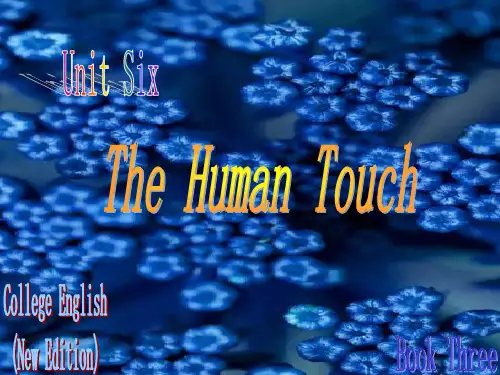
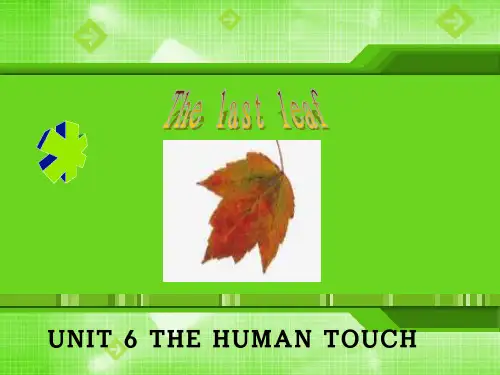
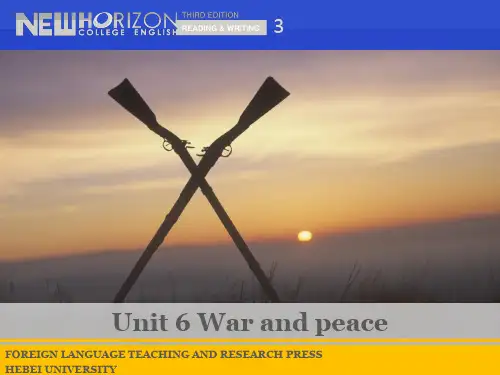
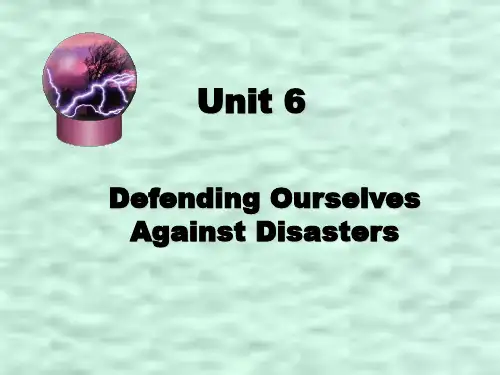
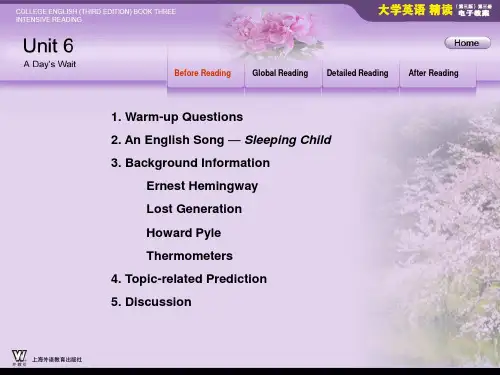

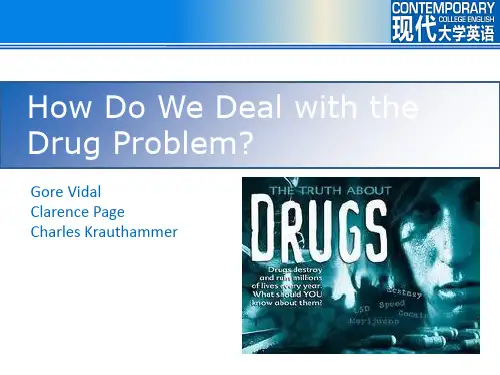
Unit 6ACTIVITY 1The text from Last Man Down offers an eyewitness account of a defining historical event of 9/11 __attack_____from the perspective of Richard Picciotto, a __ firefighter_______; his story is that of a man, a hero, and a tragic event that inspired the nation. His recount is not one of death and destruction, but a celebration of life and its unpredictable __nature_______.1.I thought how we fir emen were always saying to each other, “I’ll see you at the big one.” Or, “We’ll all meet at the big one.” I never knew how it started, or when I’d picked up on it myself, but it was part of our shorthand. Meaning, no matter how big this fire is, there’ll be another one bigger, somewhere down the road. We’ll make it through this one, and we’ll make it through that one, too.我想起我们消防员平常总互相打趣说:“在大火中见吧。
Lesson One Your College YearsI. Teaching Objectives:After learning this unit, students are supposed to:1)get familiar with some grammatical points;2)get to know what college is designed to be3)get a list of the new words and expressions and be able to use them freely in writing and daily conversation;4) have a thorough understanding of the whole text:Your College Years5) retell the text as a wholeII.Listening and speaking activities1.Listen to the recording of the text and fill in the blanks about the main ideas of the article.2.Talk about the purpose of your college years.III. Reading Comprehension and Language Activities1. Pre-reading discussions:1)Being a college student for more than one year, have you realized your changes?What are they?2)What’s your opinion about the purpose of a college?•Identity Crisis (认同危机)•A) A psychosocial state or condition of disorientation and role confusion occurring especially in adolescents as a result of conflicting internal and external experiences ,pressures, and expectations and often producing acute anxiety . •B) An analogous state of confusion occurring in a social structure , such as an institution or a corporation.•Southwestern Baptist Theological Seminary•Southwestern Baptist Theological Seminary, located in Fort Worth , Texas ,is a private ,non-profit institution of higher learning associated with Southern Baptist convention whose stated mission is “to provide theological education for individuals engaging in Christian ministry .”It is one of the largest seminaries in the world and is credited by the Associations of Theological schools and also by the Southern Association of Colleges and Schools toward diploma, masters and doctoral degrees. The school uses the Baptist and Message as its confession of faith .3. About the text:It’s about the author’s idea towards the college years. It can be divided into six parts:Part 1 (para.1) Introduction: College students will go through key changes in their college years.Part 2 (Para. 2-6) Establishment of college students’ personal sexual and social identity in the college.Part3 (para.7) Affirmation of personal values such as religious faith, their values, and theirmorals.Part 4 (para.8 ) Development of new ways to organize and use knowledge.Part 5(para.9) Expansion of their world knowledge.Part 6 (para.10) Summary: College students are growing in their understanding of themselves, others and the world in which they live.4. Language points1) Words and expressionsto handle(1)to turn, to lift or turn with the handsThis box contains delicate china .Please handle with care .(2)to operate with handsThis computer is easy to handle .(3)to manage control or cope withThank you . But I can handle it myself .handle n. 把,柄This knife has a carved handle.to apply(1)to make a formal and usually written request for a job , position , permission etcShe is applying for a scholarship(2)to use a method , law ,principle etc in a particular situation(3)applicant n. the one who appliese.g. We should apply this theory to practice.(4)to affect or concern somebody or somethingNot all natural laws can apply to human society .(5)to bring something into nearness or contact with somethingApply some of this ointment to the swollen part ,and the pain will soon be gone .application n.2). Grammatical structure•I knew we had them licked.•She’d never say a word about all the weeks he’d been away, not leaving us a cent for food.•I found myself seeing my father in a different way and relating to him as a friend whom I could encourage.•It seemed to me then that he was always showing off.5. Post-reading discussion:What are your goals for the college years?。